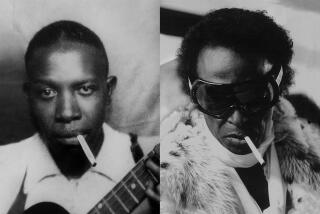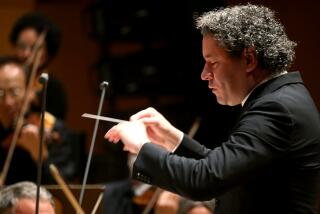UCSD Library Receives Betty Freeman Collection : Music: The philanthropist has chosen the site to house her collection of letters, scores and concert programs from trend-setting American composers.
SAN DIEGO — Betty Freeman, an avid patron of avant-garde music, will donate her library of contemporary music scores, composers’ correspondence and autographed concert programs to the music library at UC San Diego.
Freeman’s personal library contains 200 letters from a rich cross-section of trend-setting American composers, including John Cage, John Adams, Virgil Thomson, Terry Riley and La Monte Young. The collection’s inventory lists 50 signed recordings, 100 signed programs, posters, books, videos, and two drawings by John Cage.
Freeman chose UCSD to receive her collection because John Stewart, former provost of UCSD’s Muir College and founder of the university’s music department, approached her five years ago. She did not consider any other school or conservatory as the possible beneficiary.
“They asked me, and I jumped at the opportunity,” Freeman said in a phone interview Saturday.
The university announced the gift Friday and will salute Freeman, a Beverly Hills philanthropist, on April 16 with an exhibition at the UCSD library of her photographs of composers. UCSD’s contemporary music ensemble, SONOR, will perform a concert in her honor.
A university spokesperson said the school could not set a value for the collection, which has not yet been appraised.
Freeman has supported new-music performance since the early 1960s, commissioning about 30 compositions. “I love classical music,” she said. “My contribution of energy, enthusiasm and dollars is my way of putting something back into music.”
“She is the patron saint for new-music life in California,” said Ara Guzelimian, artistic administrator of the Los Angeles Philharmonic. “I cannot underestimate her importance. She supported composers such as John Cage and John Adams at a point in their careers when they were still undiscovered. Her concern for composers’ welfare encompassed financial support as well as personal kindnesses.”
According to Lynda Claassen, head of the UCSD library’s special collections, Freeman’s gift will complement the UCSD library’s holdings of personal and professional papers of composer Ernst Krenek, musicologist Peter Yates and jazz musician Calvin Jackson.
One of the major patrons of UCSD’s 1986 Pacific Ring Festival, Freeman traced her association with the university back to the 1960s when she supported American composer Harry Partch.
“I was involved with Partch’s music from 1964-74. Partch was regents professor at UCSD once, and I believe they let him keep a studio there for a while.”
Freeman also championed UCSD emeritus professor Robert Erickson, commissioning his large orchestral work “Auroras,” which was given its premiere in 1965 by the Los Angeles Philharmonic under Leonard Slatkin.
Freeman noted that the content of her correspondence with composers’ varies greatly. Letters from Cage, whose celebrated piece “4’ 33” “ is total silence, are understandably terse.
“But letters from John Adams and Steve Reich, for example, discuss problems they faced writing their works,” Freeman added.
In 1981, Freeman began a monthly concert series in her Beverly Hills home devoted to new music. Like Arnold Schoenberg’s private concerts in Vienna at the turn of the century, Freeman’s musical evenings presented the most uncompromising new music for an invited audience of cognoscenti.
“At these concerts, we would often hear a work in progress,” the Philharmonic’s Guzelimian noted.
“She was amazingly egalitarian in her taste. One Sunday we would hear (French composer Pierre) Boulez, and the next time it might be a couple of composers in their early 20s. I recall one session with Peter Sellars and John Adams long before the premiere of their opera, “The Death of Klinghoffer.” They talked about the new opera and Adams played a home recording of some of the scenes from it.”
More to Read
The biggest entertainment stories
Get our big stories about Hollywood, film, television, music, arts, culture and more right in your inbox as soon as they publish.
You may occasionally receive promotional content from the Los Angeles Times.










